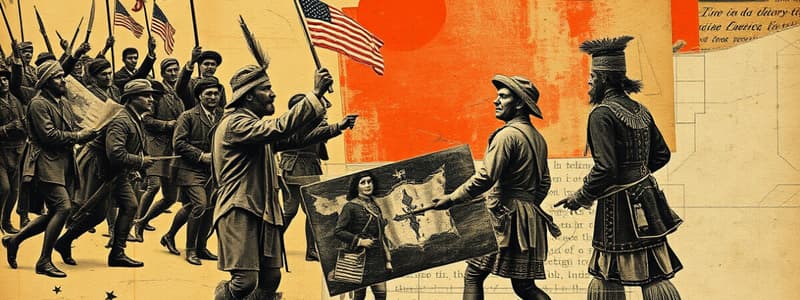Podcast
Questions and Answers
What was one of the primary economic causes of the rebellion?
What was one of the primary economic causes of the rebellion?
- Government incentives for farming
- Increased land sales by the colonial government
- Widespread poverty among frontier settlers (correct)
- High tobacco prices benefitting all settlers
Which factor contributed to the social dynamics of Virginia in the 1670s?
Which factor contributed to the social dynamics of Virginia in the 1670s?
- Emergence of a distinct frontier settler identity (correct)
- Dominance of the Anglican Church without dissent
- Collaboration between wealthy landowners and small farmers
- Equal representation in colonial assemblies
What was one significant change in colonial policy after the rebellion?
What was one significant change in colonial policy after the rebellion?
- Strengthening of the governor's powers
- Increased reliance on indentured servitude
- Greater attention to the needs of frontier settlers (correct)
- Reduction of military presence in frontier areas
How did the rebellion impact labor practices in Virginia?
How did the rebellion impact labor practices in Virginia?
What was a direct result of the government's response to the rebellion?
What was a direct result of the government's response to the rebellion?
Which social issue was highlighted by the class struggle in 1670s Virginia?
Which social issue was highlighted by the class struggle in 1670s Virginia?
What was one of the underlying issues related to land that fueled the rebellion?
What was one of the underlying issues related to land that fueled the rebellion?
How did the rebellion influence the political landscape in Virginia?
How did the rebellion influence the political landscape in Virginia?
Flashcards are hidden until you start studying
Study Notes
Causes Of The Rebellion
- Economic Discontent:
- Widespread poverty among frontier settlers.
- High taxes and low tobacco prices strained the economy.
- Land Disputes:
- Competition for land between settlers and Native Americans.
- Unmet demands for land access from the colonial government.
- Government Corruption:
- Perceived favoritism of the colonial elite and Governor William Berkeley.
- Lack of representation for lower-class settlers in government decisions.
- Native American Conflicts:
- Increasing tensions and violent confrontations with Native American tribes.
- Demand for military action against Native Americans was ignored by the government.
Aftermath And Significance
- Repression of Dissent:
- Harsh measures taken against participants; executions and imprisonments.
- Increased government vigilance over dissent and rebellion.
- Changes in Colonial Policy:
- Shift in governance with more attention to the needs of frontier settlers.
- Reduction in the power of the governor and the establishment of a more representative assembly.
- Impact on Slavery:
- Rise in the reliance on African slavery as a stable labor force.
- Shift to a more rigid racial caste system to prevent future alliances between poor whites and blacks.
Social Dynamics Of 1670s Virginia
- Class Struggle:
- Clear division between wealthy landowners and small farmers/indentured servants.
- Growing discontent among lower classes due to economic inequality.
- Frontier Settler Identity:
- Emergence of a distinct identity among frontier settlers, often marginalized by the elite.
- Desire for autonomy and protection against Native American raids.
- Religious Influences:
- Some dissenting voices among the population driven by religious motivations.
- Rise of a more diverse religious landscape challenging the Anglican Church's dominance.
Impact On Colonial Policies
- Increased Regulation:
- Implementation of stricter laws to control land distribution and settlement.
- Greater military presence in frontier areas to prevent uprisings.
- Shift in Labor Practices:
- Transition from indentured servitude to African slavery as primary labor source.
- Long-term policies to ensure a stable and controlled labor force.
- Political Reforms:
- Introduction of measures to increase representation of lower classes in government.
- Emergence of political factions and movements advocating for settler rights.
Causes Of The Rebellion
- Economic hardships created widespread poverty among frontier settlers, fueled by high taxes and low tobacco prices.
- Intense competition for land led to disputes between settlers and Native Americans, compounded by unmet colonial government demands for land access.
- Perceived corruption manifested as favoritism toward the colonial elite, particularly under Governor William Berkeley, leaving lower-class settlers without representation.
- Increased tensions resulted in violent confrontations with Native American tribes, with settlers demanding government action that was largely ignored.
Aftermath And Significance
- Harsh repression followed the rebellion, with participants facing executions and imprisonments, marking a significant increase in government vigilance over dissent.
- Colonial governance shifted to address the needs of frontier settlers, resulting in reduced power for the governor and a more representative assembly formation.
- The rebellion escalated reliance on African slavery for labor, leading to the establishment of a rigid racial caste system to prevent potential alliances between impoverished whites and blacks.
Social Dynamics Of 1670s Virginia
- A pronounced class divide emerged between wealthy landowners and small farmers/indentured servants, sparking discontent among lower classes due to economic disparities.
- Frontier settlers developed a unique identity, feeling marginalized by the elite, and expressing a desire for greater autonomy and protection from Native American attacks.
- Religious influences played a significant role in dissent, with a rise in diverse religious perspectives challenging the Anglican Church's dominance.
Impact On Colonial Policies
- Stricter regulations were introduced to control land distribution and settlement patterns, alongside increased military presence in frontier zones to deter uprisings.
- Labor practices evolved from a reliance on indentured servitude to an emphasis on African slavery as the primary labor force, ensuring stability and control.
- Political reforms included measures aimed at increasing lower-class representation in government, leading to the formation of political factions advocating for settler rights.
Studying That Suits You
Use AI to generate personalized quizzes and flashcards to suit your learning preferences.



